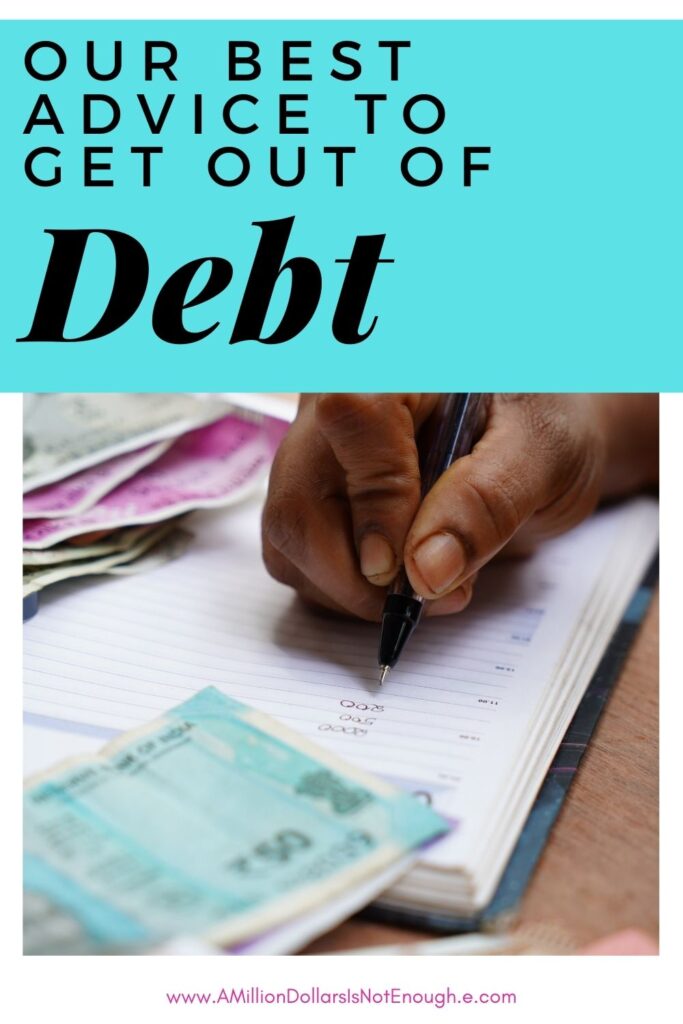Are you looking for ways to get out of debt? You’re not alone. In the United States, the total amount of debt in the Spring of 2021 was $14.6 trillion, and it’s shared among nearly 340 million people!
We all know what it’s like to be in debt. You’re juggling multiple payments each month, and the interest is piling up. It feels like you’re never going to get ahead.
But there is hope!
Getting out of debt is possible with the right plan and some determination. There are plenty of strategies that can help make the process a little bit easier. Today, we will discuss some of the best ways to become debt-free.

How much debt do individuals have?
The average American has $38,000 in personal debt, excluding home mortgages. This includes money owed on credit cards, car loans, student loans, and other types of installment debt.
The breakdown of average debt taken by different generations:
- Gen Z (born 1997-2012): $16,043
- Millennials (born 1981-1996): $87,448
- Gen Xers (born 1965-1980): $136,000
- Baby Boomers (born 1946-1964): $97,290
- Silent Generation (born 1928-1945): $41,218
As you can see, debt is a problem that affects people of all ages. No matter how much debt you have, it’s important to develop a plan to pay it off.
The Consequences of Debt on Your Life
Debt can have a major impact on your life in many ways. It can affect your mental and physical health, as well as your relationships.
It’s difficult to acquire other essential loans if you’re already in debt. Don’t Let Delinquent Debt Ruin Your Finances – with free printable!
You may have a hard time getting approved for a mortgage if you’re already carrying a lot of debt. In addition to that, auto loan interest rates will also be higher if you’re deemed a high-risk borrower due to your outstanding debts.
Your debt-to-income(DTI) ratio is one of the key factors lenders look at when considering a loan. The DTI ratio is the percentage of your monthly income that goes towards debt payments. A high DTI ratio is often a red flag for lenders, as it indicates you may have difficulty making your loan payments.
For example, You earn a monthly gross salary of $5000 and your current monthly debt payments are $2000. Your DTI ratio would be 40% (($2000/$5000) x 100).
Most lenders prefer to see a DTI ratio of 36% or less. If yours is higher, you may have difficulty qualifying for a loan.
Your credit score will suffer if you’re in debt. A low credit score can lead to higher interest rates. It can also affect your ability to find a job or rent an apartment.
Also, worrying about money is one of the most common sources of stress. According to a survey by the American Psychological Association, 72% of people said that money was a significant source of stress in their lives.
Debt can also strain your relationships. A study by Money Management International found that couples who argued about money were more likely to get divorced.
So, as you can see, debt can have a major impact on your life. That’s why it’s so important to develop a plan to get out of debt.
The Best Strategies to Get Out of Debt
In order to become debt-free, you need to develop a plan and stick to it. Below are some of the best strategies for getting out of debt:
1. Have a clear idea of your debts and plan around it
The first step to getting out of debt is understanding exactly how much you owe. Make a list of all your debts, including the creditor, balance, interest rate, and minimum payment.
It’s also important to know the types of debt you’re dealing with. Having a clear understanding of your debts will help you develop the best strategy for paying them off.
You may choose to focus on paying off your high-interest debt first. Or you may want to tackle the smallest balances first to get some quick wins under your belt. Also, debt consolidation is an option worth considering if you have multiple debts with high-interest rates.
A debt consolidation loan can help you pay off your debt by combining all your debts into one loan with a lower interest rate. This can help you save money on interest and make it easier to pay off your debt.
Though debt consolidation can have a negative impact on your credit score in short term, it can be helpful in the long run if you’re struggling with high-interest debt.
You can also try negotiating with your creditors to get a lower interest rate or even a reduction in the balance. This is called debt settlement.
PIN THIS NOW FOR LATER
Debt settlement should be considered as a last resort, as it can have a negative impact on your credit score. If you are getting calls, you can use these tips How to Get Rid of Debt Collectors until you have a handle on the situation.
If you’re not sure where to start, there are plenty of debt payoff calculators available online that can help you develop a plan.
2. Evaluate your spending habits and see where you can cut back
One of the best ways to become debt-free is to take a close look at your spending habits. and see where you can cut back.
- Do you need that daily coffee from Starbucks?
- Could you cook more meals at home instead of going out to eat?
- Could you downsize your home or get rid of your car to save money?
By evaluating your spending habits, you can make small changes that will add up over time and help you become debt-free.
Suppose you spend $100 per week on coffee, eating out, and other unnecessary expenses. If you cut back to just $50 per week, you would save $2600 over the course of a year. That’s a significant amount of money that could be put towards paying off debt.
3. Negotiate a lower interest rate on your credit cards or other debt
If you have a good credit score, you may be able to negotiate a lower interest rate on your credit cards or other debt. This can save you a lot of money over time and help you become debt-free faster.
You can negotiate for a lower interest rate, a longer repayment period, or even a lump-sum payment.
If you’re not sure how to negotiate with your creditors, there are plenty of resources available to help you.
You can also consider working with a debt settlement company. These companies will negotiate with your creditors on your behalf and try to get them to agree to a settlement.
However, debt settlement can have a negative impact on your credit score. It’s important to weigh the pros and cons of debt settlement before deciding if it’s the right option for you.
For credit cards, you may also be able to transfer your balance to a 0% APR credit card. This will allow you to pay off your debt without accruing any additional interest.
However, keep in mind that 0% APR offers typically only last for a limited time, usually 12-18 months. After that, the interest rate will go up, so you’ll need to be sure you can pay off your debt before then.
Check out these 3 Methods to Reduce Credit Card Debt for more tips.
4. Make a budget and stick to it
Making a budget is one of the best ways to become debt-free. By tracking your income and expenses, you can make sure you’re spending less than you’re bringing in each month. This will help you have more money to put towards paying off your debt.
There are a number of ways to make a budget, but one of the easiest is to use a budgeting app like Mint or YNAB.
These apps will track your income and expenses, and help you see where you can cut back.
Top 7 Questions to Ask When Creating a Family Budget might help you out.
Once you have a budget in place, make sure you stick to it. It’s easy to overspend when you’re not keeping track of your finances.
But if you stick to your budget, you’ll be well on your way to becoming debt-free.
5. Take on extra work or start a side hustle to make more money
If you’re struggling to make ends meet, taking on extra work or starting a side hustle can be a great way to make more money. This additional income can be used to pay off your debt faster and become debt-free.
There are a number of ways to find extra work or start a side hustle. You can freelance your services online, start a blog and sell ads, or even start a small business.
Whatever you do, make sure it’s something you’re passionate about. Otherwise, it will be difficult to stick with it.
If you’re not sure where to start, there are a number of websites that can help you find extra work or start a side hustle.
Fiverr, for example, is a great resource for finding freelance work. And if you’re interested in starting a blog, WordPress and Blogger are two popular blogging platforms.
By taking on extra work or starting a side hustle, you can make more money and become debt-free.
6. Sell unnecessary belongings for extra cash
If you’re looking for a quick way to make some extra money, selling your unused or unwanted belongings is a great option. You can sell items online through sites like eBay or Craigslist, or have a garage sale.
You’d be surprised how much money you can make by selling your stuff. And the more money you make, the faster you can become debt-free.
Suppose you have a collection of DVDs that you never watch. Or maybe you have some old clothes that no longer fit. Whatever it is, if you don’t need it, sell it.
You can even sell items that are broken or damaged. There are a number of sites that will buy your broken electronics or damaged jewelry.
So before you throw something out, see if you can sell it and make some extra cash.
7. Ask for a raise
One of the best ways to become debt-free is to ask for a raise. If you’re working hard and making a good contribution to your company, chances are you deserve a raise. And with that extra income, you can pay off your debt faster and become debt-free.
Of course, asking for a raise can be daunting. But if you do your research and prepare in advance, you’ll be more likely to get the raise you deserve.
Start by researching the going rate for your position and skillset. Then, put together a list of your accomplishments and contributions to the company.
Finally, practice asking for a raise so you’re prepared when the time comes.
8. Learn to say ‘No!’
One of the best pieces of advice for becoming debt-free is to learn to say “no.” It’s easy to get into debt if you’re constantly spending money on unnecessary things. But if you can learn to curb your spending, you’ll be well on your way to becoming debt-free.
Start by evaluating your spending habits.
Do you tend to spend money when you’re bored or stressed?
Do you buy things you don’t need?
Once you identify your spending triggers, it will be easier to say “no” when they arise.
It’s also important to have a budget and stick to it. We’ve already discussed it before. When you know how much money you have to spend each month, it’s easier to say “no” to unnecessary purchases.
If you want to become debt-free, learning to say “no” is essential.
9. Being Accountable to someone
Finally, one of the best pieces of advice for becoming debt-free is to be accountable to someone. When you’re trying to get out of debt, it’s easy to make excuses. But if you have someone to hold you accountable, you’re more likely to stay on track.
You can be accountable to a friend or family member, or even a financial advisor. The important thing is to have someone who will support you and help you stay on track.
Suppose you’re trying to pay off $500 of debt each month. If you miss a month, your accountability partner can help you get back on track. They can also offer support and encouragement when you’re feeling discouraged.
10. Choose a debt repayment method:
Another step in becoming debt-free is to choose a debt repayment method. There are a number of different methods you can use, and the best one for you will depend on your individual circumstances.
One popular method is the snowball method. With this method, you focus on paying off your smallest debt first. As you pay off each debt, you use the money you would have used to make that payment to pay off your next debt. This method can be effective because it gives you a sense of progress as you pay off each debt.
We like this article too: The Crazy-Easy Guide To Pay Off Debt Fast where you will also learn that there is another popular method called the avalanche method. With this method, you focus on making minimum payments on all debts and then paying off your debt with the highest interest rate first. This can save you money in the long run because you’ll be paying less interest.
Which method you choose is up to you. The important thing is to find a method that works for you and stick with it. Once you’ve chosen a method, all that’s left to do is start making those payments and watch your debt disappear.
11. Stay disciplined and committed to getting out of debt
The most important thing you can do to become debt-free is to stay disciplined and committed. It’s easy to get discouraged when you’re in debt. But if you remain focused on your goal, you’ll be more likely to achieve it.
Set a goal for how much debt you want to pay off each month, and make a plan to do it. Automate your payments so you don’t have to think about it, and make sure you pay more than the minimum each month.
The key is to stay disciplined and committed to becoming debt-free. If you do, you’ll be well on your way to a debt-free life.
To Wrap It Up
There you have it! These are some of the best strategies to become debt-free. If you’re struggling with debt, try out one or more of these strategies and see how they work for you.
And remember, the most important thing is to stay disciplined and committed to becoming debt-free. With a little effort, you can achieve your goal and start the new year off on the right foot.
Do you have any tips for becoming debt-free? Share them in the comments below!
Other articles you may find interesting:
- What is the 4 Percent Rule and Can it be a Plausible Choice?
- Top Tips on How to Pick a Financial Planner
Originally posted 2022-03-27 17:44:56.



Pingback: Money Market Account vs CD: Which is the Better Fit for You? - A Million Dollars Is Not Enough
Pingback: Student Loan Debt 2022: Ways to Deal with It Effectively - A Million Dollars Is Not Enough
Pingback: Tips On Financing a Car: How to be a Smart Buyer - A Million Dollars Is Not Enough